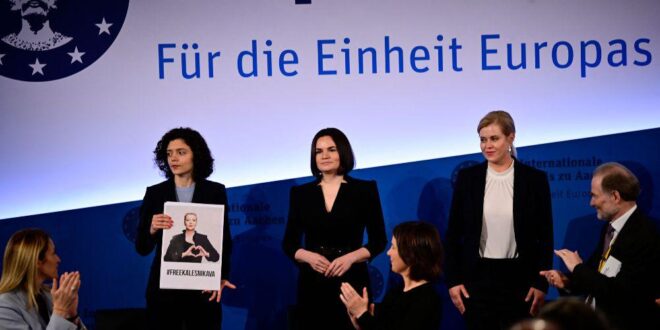The clandestine standoff between Belarusians and Lukashenka’s regime continues. To ensure regional and global security, the EU needs a coherent strategy in support of the Belarusian people.
Belarus has always been on the margins of Europe, let alone of world politics. 2020 seems to have changed that. In response to the rigged presidential election, hundreds of thousands took to the streets demanding change.
Aliaksandr Lukashenka who sees his vocation as president for life, responded to these protests with unprecedented violence. More than 40,000 civilians were imprisoned—many of whom were tortured—, several were murdered, and many were exiled. Now, around 1,500 political prisoners are deprived of the right to see or receive correspondence from their close kin and held in hell-like conditions. Several hundred thousand fled the country, hoping to return home one day.
Russia’s war against Ukraine in February 2022 dashed these hopes once more. Belarus is now seen as a co-aggressor and supporter of Russian President Vladimir Putin’s war. Yet Belarusians continue their own war for freedom of a different kind to that in Ukraine. They want an end to the Lukashenka regime.
Despite occasional protests, Lukashenka managed to remain the country’s only president since 1994—that is, until 2020. He created a relatively stable system of authoritarian governance based on the social contract. The majority of the population agreed not to participate in politics in return for economic, social, and cultural benefits.
So, in early 2020, the Belarusian authorities had no reason to expect problems with the upcoming elections. The political opposition had been marginalized, civil society had been largely subdued, and had its energy directed into non-political activities. Belarusians seemed politically apathetic, accepting that Lukashenka would remain in power for life.
But in early 2020, the Belarusian authorities made an error. Lukashenka’s refusal to recognize the Covid-19 emergency as a threat to public health appalled and mobilized Belarusians, laying the foundations for self-organization and self-reliance.
A full-scale political crisis was unleashed after the falsified election of August 9, 2020. The violence against peaceful demonstrators led to the death of several people and arbitrary detention of thousands more. People rose up against the regime’s violence. The standoff between civilians and the regime lasted for several months, with the former eventually giving in to the unprecedented scale of repression, being either detained and imprisoned, or moving underground to sabotage the regime where possible.
In 2020, a new democratic leadership—now known as the Belarusian Democratic Forces—emerged. During the electoral campaign, there was the famous female trio. Then, Sviatlana Tsikhanouskaya announced the creation of the Coordination Council and later established her office (OST). The National Anti-crisis Management (NAM) headed by Paval Latushka and several other political organizations were then established and today continue to act in exile.
In the summer of 2022, OST, NAM, and several other representatives formed the United Transitional Cabinet (UTC) headed by Tsikhanouskaya. Its major function is to represent Belarus internationally.
In addition, the Kastus Kalinouski Regiment, which fights in Ukraine and is a part of the Ukrainian Armed Forces, also has an ambition to change the regime.
For all these organizations in exile, the challenge is maintaining their influence inside Belarus. While they achieve enormous success in international advocacy on behalf of the Belarusian people, their voice within the country is not always heard.
In addition to the main goals set in the aftermath of the 2020 events—to free all political prisoners, to ensure justice and accountability to all regime’s crimes, to ensure the peaceful transfer of power, and to hold new elections—the Democratic Forces today also fight to protect their country’s sovereignty and international safety.
Belarusian territory is currently being used by the Russian military for training, logistics and a constant threat of invasion across the Belarusian border. The country is also under the threat of being absorbed by Russia. There is a far greater danger ahead. Lukashenka offered to store Russian tactical nuclear weapons (Iskander-M missiles, with a range of 500 km) in Belarus in decrepit facilities and poor management.
All this is happening against the will of the Belarusian people. It points to both an open and a hidden war between the people demanding change, and dictators like Lukashenka and Putin.
What is the EU doing in response to all this?
The union supports Belarus in different ways but in a reactionary and haphazard manner. Despite the EU’s commitment to supporting civil society, its ability to exert geopolitical and economic pressure on the regime has been limited. This is further exacerbated by the lack of a strategy toward Belarus.
Furthermore, the Belarusian regime’s involvement in the war has made it even more challenging for the EU to develop a coherent and effective policy. Any delay to do so while Russia’s war against Ukraine continues, could lead to Belarus’s full absorption by Russia.
That is why Belarus matters. There can be no regional and global security without Ukraine and it is equally impossible without Belarus, given the clandestine standoff between the people and the regime. Furthermore, Lukashenka’s regime violates the Nuclear Non-Proliferation Treaty (NPT), threatens the world with nuclear war.
In short, there will be no peace in Europe unless Lukashenka is defeated. For this to happen, Europe needs a clear strategy—now and for when Ukraine wins.
 Eurasia Press & News
Eurasia Press & News


